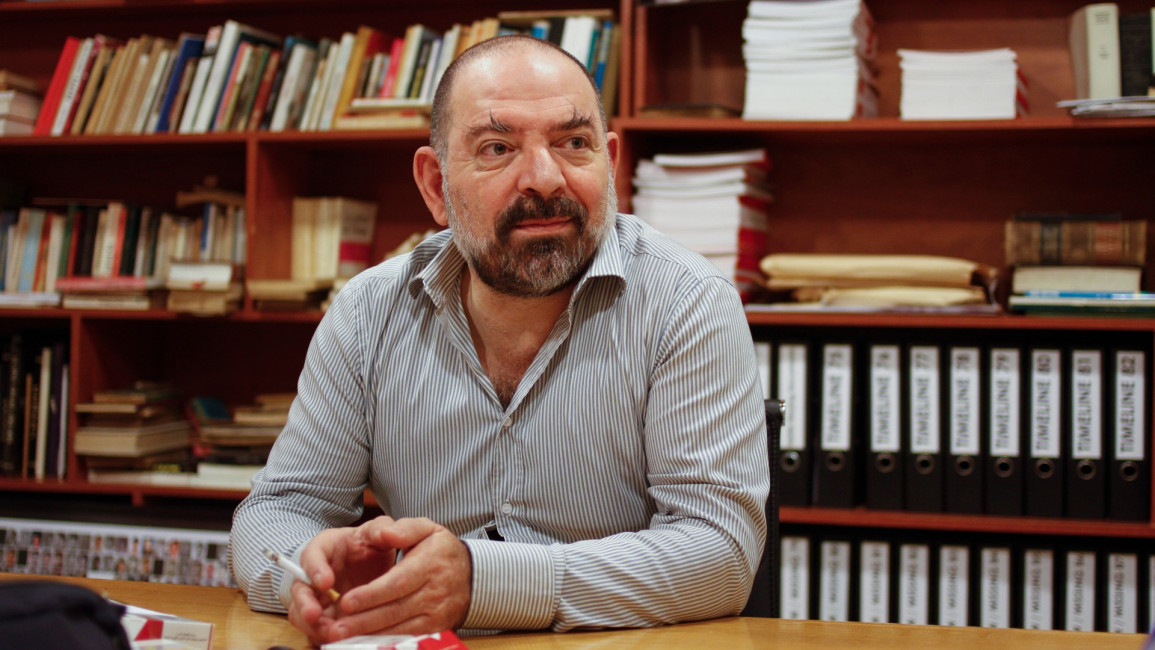
With Lokman Slim's assassination, Lebanon sinks even further into impunity
The news that Slim - a leading Hezbollah critic - had been shot dead in his car in South Lebanon last Thursday, came as a shock to political and civil society activists alike. They pointed the finger at Hezbollah, which controls the area where he was abducted and killed, and highlighted threats he had received as a result of his strong opposition to the Shia armed group.
Lokman Slim was a publisher, an accomplished writer, a civil society leader, and an archivist who collected and preserved historical and valuable materials dedicated to the memory of Lebanon's civil war. To this end, he and his wife, Monika Borgmann, founded UMAM Documentation and Research.
He produced award-winning documentary films, including one on the 1982 Sabra and Shatila massacre, and another on Syria's Tadmor prison. These were featured along with many other art exhibitions and films in the UMAM Hangar, a former warehouse that the pair turned into a cultural venue in 2005. The centre - which brought some plurality to the neighbourhood - is located next to Lokman Slim's family home in Dahyeh, the southern suburbs of Beirut that are controlled by the most dominant political player and military force in Lebanon, Hezbollah.
Lokman Slim, a Shia himself, insisted he would continue living and operating from Dahyeh, despite threats to his life that reached a peak in December 2019, when threatening messages reading, "Lokman Slim the traitor the collaborator," and "Glory to the one who silences the voice," were plastered on the gate of his house.
 |
His assassination does not target him alone |  |
These threats came two months after the start of the 17 October revolution that saw taboos broken, as the Shia populace, for the first time, publicly pointed a finger at their own leaders and blamed them for their grievances. They were clearly related to his political views and his open calls to defeat Hezbollah, such as at the 2018 conference titled 'Deciphering Hezbollah's Code' in UAE.
But regardless of your views on his politics, his assassination does not target him alone. It targets pluralism and diversity within the Shia community and the democracy of Lebanon.
Twitter Post
|
Today, even Hezbollah allies are facing increased pushback. Despite strong indications his killing was politically motivated, a social media campaign orchestrated by Hezbollah supporters targeted long-time Hezbollah ally and Sunni member of parliament, Osama Saad, accusing him of betrayal for describing Lokman Slim's killing as a political assassination, even though he stopped short of explicitly accusing Hezbollah.
Shortly after Lokman Slim's killing, Hezbollah called for speeding up the investigations to stop political opponents from "exploiting" the case to pressure the party. And while there have been international calls for a credible investigation, the general sense in the country is that such formal inquiries will not lead to any substantial findings.
Read more: Lokman Slim: The daring Lebanese activist, admired intellectual
Slim's assassination comes exactly six months after the Beirut port explosion that killed at least 200 people and injured over 5,000. The estimated 2,750 tons of ammonium nitrate that caused it had been stored in conditions that fall short of safety standards for six years.
The investigation into that disaster has been on hold since 17 December 2020, after two former ministers accused of negligence asked the Court of Cassation to replace Investigating Judge Fadi Sawan - a reminder of how weak and politicised Lebanese investigations are.
In at least 15 previous political assassinations and attempted killings that took place between 2004 and 2013 in Lebanon, there has been a failure to establish truth and hold perpetrators accountable. This gave space to the country's politicians to trade accusations and score political points. Many of these politicians were themselves war criminals who benefited from an amnesty law in 1991, one year after the end of the civil war.
The most reasonable scenario in a country where impunity is the norm appears to be that Lebanese investigations into Lokman Slim's killing will lead nowhere. His family are also not hopeful about justice. His sister, Rasha al-Ameer told France 24: "Justice never happened in Lebanon… we've seen what happened in the international court for [former prime minister Rafiq] Hariri… we've seen a lot of murders and we never got real justice…. I don't think that we will have justice."
 |
It targets pluralism and diversity within the Shia community and the democracy of Lebanon |  |
On 18 August 2020, the Special Tribunal for Lebanon handed down a weakened verdict that found one Hezbollah-linked individual guilty beyond reasonable doubt in the 2005 killing of Rafik Hariri. The Leidschendam-based court said there was no evidence that there was Syrian involvement, or that Hezbollah leadership had any involvement in the killing.
Whatever may come of an investigation into Lokman Slim's killing, his family has pledged to keep his legacy alive. Two days after he was killed, his wife updated her Facebook profile with a black poster and two words in Arabic: "Zero Fear". Clearly, his family and friends will continue to implement his ideas - including that of accountability - which cannot be snubbed out with his assassination.
Cilina Nasser is a Beirut-based independent researcher and expert on human rights, who also works on transitional justice issues. She has worked extensively on investigating human rights abuses and violations of international humanitarian law, primarily in Syria and Lebanon, as well as other countries in the Middle East and North Africa.
Follow her on Twitter: @CilinaNasser
Have questions or comments? Email us at editorial-english@alaraby.co.uk
Opinions expressed in this article remain those of the author and do not necessarily represent those of The New Arab.



